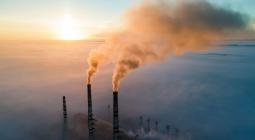John Kerry: relying solely on CO2-removal technology is ‘dangerous’

Relying too heavily on technology to remove carbon dioxide from the atmosphere is dangerous and a cause for alarm, John Kerry has warned.
The US special presidential envoy for climate said in an interview that new technologies may not prevent the world from passing “tipping points”, key temperature thresholds that, once passed, could trigger a cascade of unstoppable physical effects.
“Some scientists suggest that it’s possible there could be an overshoot [of global temperatures, beyond the limit of 1.5C above pre-industrial levels that governments are targeting] and you could clawback, so to speak – you have technologies and other things that allow you to come back,” Kerry told the Guardian.
“The danger with that, which alarms me the most and motivates me the most, is that according to the science, and the best scientists in the world, we may be at or past several tipping points that they have been warning us about for some time,” he said. “That’s the danger, the irreversibility.”
He called on governments to deploy renewable energy faster, along with related technologies such as electric vehicles. These are already available for widespread deployment, and could prevent the world from reaching the high levels of carbon dioxide in the atmosphere that would cause temperatures to breach the 1.5C threshold.
“Part of the challenge we face right now is countries that have technologies available to them are not necessarily deploying them at the rate that they should be,” he said. “Fatih Birol [executive director of the International Energy Agency] has made it very clear for some time that all you need to meet the 2030 goal of 45% reduction [in greenhouse gas emissions] globally is to deploy renewables in the current state of technology, and that’s not happening.”
“There’s a resistance right now that I see from several quarters to doing what we know we need to do,” Kerry said. “I think there are things that are really quite simple that we could be doing, but it requires political will, it requires resources, allocation and a determination to get the job done.”
He pointed to the Inflation Reduction Act, the $369bn (£296bn) push by the US to invest in renewable energy and low-carbon technologies. EU governments have protested at aspects of the legislation, such as tax breaks for green companies to set up in the US, which they see as protectionist and a potential competitive threat.
erry countered that the US measures were good for all countries. “If we accelerate the pace of discovery, then the world benefits. This is not a US-centric thing,” he said. “If we can advance those technologies very rapidly, then we’re sworn to share them, and help people to develop similarly. That’s the way collectively we try to meet the challenge.”
He said the act, passed last summer, was already making an impact. “People are shifting and realising the best thing to do. There are a number of countries in Europe – Germany, and France, and others – that are hell-bent to do a similar kind of effort. They try to define it for themselves and go out and do it,” he said. “Given the trillions we need to be deploying to meet this challenge, to have something that excites investment is in everybody’s interest. We are seeing a tremendous amount of venture capital moving in the direction of some of these transition essentials.”
The UK must also pile efforts into net zero, he added. “Everybody in the world [needs a net zero strategy],” he said. “The Intergovernmental Panel on Climate Change made it crystal clear that we’re not on the track we need to be … everything needs to be increased exponentially in effort.”
The US president, Joe Biden, has come under severe criticism from climate activists, despite his green investment push, for pressing ahead with investment in fossil fuels.
In recent weeks, he approved an area of the Gulf of Mexico amounting to about 73m acres, roughly the size of Italy, for drilling for oil and gas wells. A fortnight before that, he approved the Willow project, a drilling site in Alaska that is expected to produce 600m barrels of oil over its lifetime. Further licences are also possible, and the US is looking to expand its shale gas production and export to Europe under Biden’s watch.
Kerry robustly defended these actions, on the grounds that more fossil fuels were needed temporarily because of the war in Ukraine, and said some oil and gas expansion could occur within climate limits, particularly if carbon capture and storage, or other ways of reducing the impact of the fossil fuels, could be used.
“Gas usage is an automatic 30-50% reduction over oil and coal. It’s not clean, it’s cleaner,” he said. “So now the question is, can carbon capture and storage be deployed at a scale that makes it possible to meet our goals?”
The expansion of drilling would “not have a deep impact. I’m not saying it’s impactless completely, but it’s not going to have a significant impact.” The US was still committed to its climate targets, of a 50-52% reduction in emissions by 2030, compared with 2005 levels, he added.
Kerry also pointed to the turmoil around the world, and high energy prices, caused by Vladimir Putin’s invasion of Ukraine. “We needed desperately to not allow Putin to make his gas cutoff a weapon. And because of Ukraine, and the urgency of calming the marketplace, making sure that economies are not suddenly crashing because prices are going so high that people can’t afford to live, you’ve got to have some supply. It’s transition. That’s why the goal was 2030 and then it’s 2050. It’s not tomorrow.”
He conceded that the expansion of fossil fuels in the US was difficult to explain to other countries, however. “It obviously has challenges of perception or messaging,” he said. “There’s a danger that somebody distorts it, and says ‘they did it, therefore we can do it’. That’s why I say you’ve got to understand it, you’ve got to put it in a real context of what it really means and what the impact of this is going to be.”
But he insisted that the US would still meet its climate targets. “President Biden has reiterated a full-fledged commitment to keep our target, we’re not moving on our target,” he said. “This one thing is not an aberration in terms of us walking back on our goals, or walking back on our expectations. I feel very confident about that.”
The appointment of Sultan Al Jaber as president of the next UN climate summit, Cop28, in the United Arab Emirates in November, has been condemned by activists who say his role as chief of the UAE national oil company Adnoc creates a conflict of interest.
Kerry defended Jaber, insisting that his background – which Jaber told the Guardian would help him bring a business focus to the role – would be an advantage. “Personally, I think that because he has an experience within the context of oil and gas production, and a leadership in that, he has the ability to pull some missing links to the table with respect to what we have to get done. I’m hopeful about that,” Kerry said.
Kerry also called for more private sector funding for climate finance, to help poor countries cut their emissions and cope with the impacts of extreme weather. “Climate finance is not just a challenge, it is the biggest single challenge right now,” he said. “Finance, and I mean big finance in the trillions of dollars. That requires a mobilisation of capital, using incentives and working with the private sector to bring them to the table, to create bankable projects that will excite deployment of capital.”
cover photo: John Kerry said new technologies in carbon storage may not prevent the world from passing ‘tipping points’ that would lead to climate disaster. Photograph: Fabrice Coffrini/AFP/Getty Images





